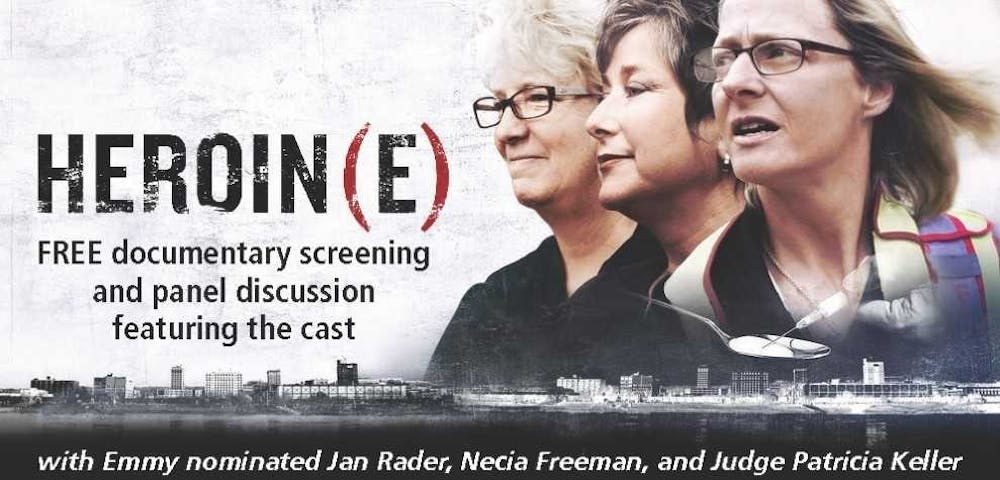Many do not think of hope when they hear about America’s modern opioid epidemic, but the Heroin(e) documentary shows how the chain of compassion holds one town together through the crisis.
Two free screenings of the acclaimed Emmy-nominated Netflix documentary Heroin(e) will be offered to students and Athens area residents. A panel discussion will follow the screenings, featuring the women of the film, including Huntington, West Virginia, Fire Chief Jan Rader, Necia Freeman and Judge Patricia Keller.
Huntington has an overdose rate 10 times the national average. The flood of heroin now threatens the Appalachian city with a cycle of generational addiction, lawlessness and poverty. Heroin(e) follows Rader, Freeman and Keller as they work to change their city and break the devastating cycle of drug abuse one person at a time.
Ohio University will host the first screening of the film Tuesday. Rebecca Miller, OU senior director of community relations, believes the documentary shows a very humanistic side of the epidemic.
“It really personalizes it, especially for people who haven’t had any personal experiences,” Miller said. “The women who are featured in the documentary do a really good job approaching people as individuals.”
The different approaches Rader, Freeman and Keller take in improving Huntington are ones Miller is hoping will show people how important it is to treat everyone with respect, regardless of what they’re struggling with.
“There are many causes that have kind of spiraled us and the rest of the nation into the opioid epidemic, and some of those causes are things people don’t think about very often,” Miller said. “Things like poverty, trauma and chronic disease in addition to the more publicized reasons. The documentary speaks to those causes somewhat, but we’re hopeful this will start the conversation around them.”
Overall, Miller expects the majority of people who plan on attending the showings have some level of awareness regarding the heroin epidemic happening around them.
“I think it has gotten a lot of publicity over the last couple of years, and I think many people will have knowledge of the epidemic or some knowledge of concurring epidemics, but they may not have seen an approach like this necessarily,” Miller said.
Athens HOPE, a local group dedicated to combating the opioid epidemic and others like it, will be among the event’s co-sponsors. Miller, who is also the chair of Athens HOPE, said the panel discussion featuring the women in the film following the screenings will hopefully bring more light and understanding to the topic.
“Athens HOPE feels that this is a really important documentary, and having these amazing women come to our community is such an opportunity for us,” she said. “We think it’s going to generate a lot of good discussion and thought. We’re hopeful a lot of people come and hear their message.”
Miller is looking forward to presenting the documentary, as well as getting the word out about Athens HOPE and what it wants to do for the Athens area.
“Our mission is to reduce stigma around addiction, promote more sensitive language, build a community around people in recovery, as well as advocate for important policy changes,” Miller said. “Many of our members will be volunteering and helping out at the event, and we’re always looking for people to get involved to help educate others about opioid abuse, as well as other substances.”
Grant Guggenbiller, a sophomore studying chemical engineering, sees how the documentary could be beneficial to one’s understanding of the epidemic.
“I feel like not enough people are aware of the situation and how bad it actually is. The stuff is horrible for you and something that, without knowing it, can destroy your life,” Guggenbiller said. “I’d probably go see the documentary. I just know that it’s a problem, but I’d also like to learn more about it.”
Madison Moran, a sophomore studying special education, also believes it’s important to have films that highlight the opioid epidemic.
“I think it’s important to have films about these epidemics to bring awareness to the issue. If not a lot of people know about the issue, it’s hard to come up with a solution for it,” Moran said. “I think I’d go see the documentary because I try to expand my knowledge about topics and issues that come my way, and this topic is very prevalent in today’s world.”






